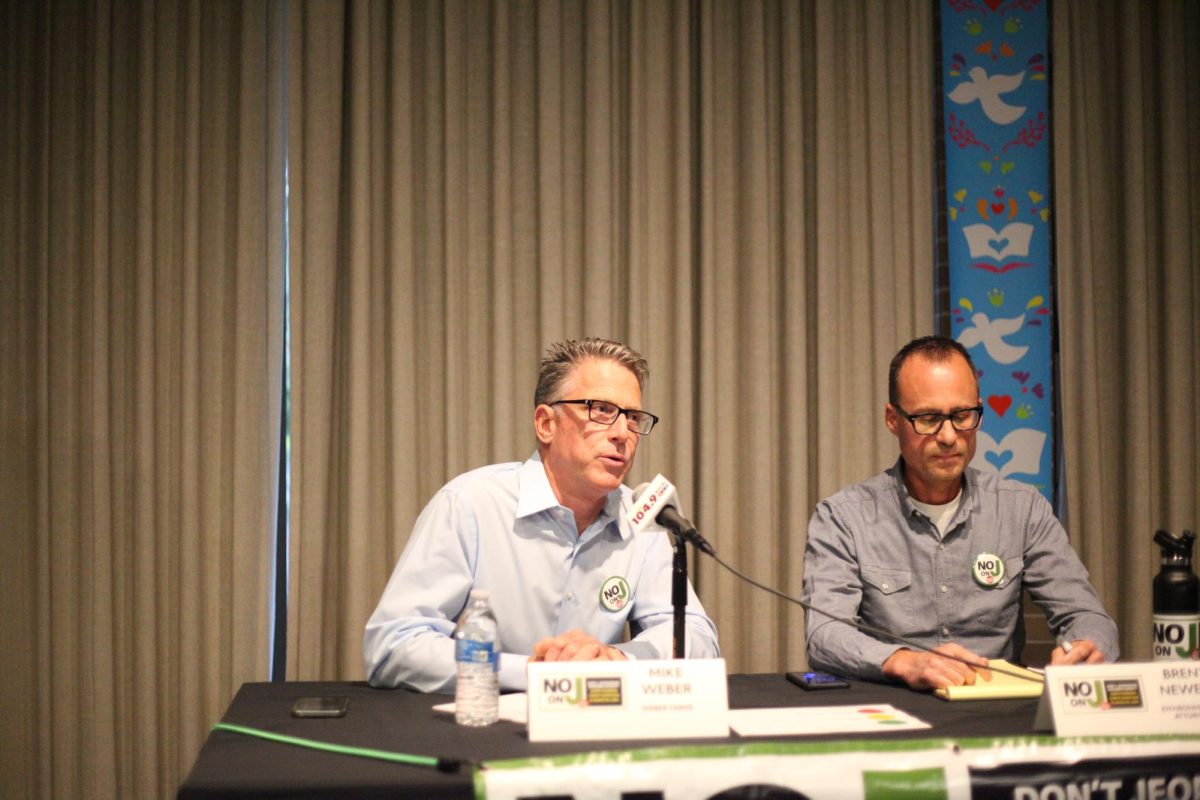Despite some laughter, discussion, and frustration in the audience at moments, the debate on Measure J on Wednesday occurred without incident.
Proponents and opponents of Measure J met Wednesday, Sept. 18 for a moderated debate at the Central Santa Rosa Library, sponsored by Northern California Public Media.
Measure J, put forth by the Coalition to End Factory Farming, is on the ballot in Sonoma County this November. It would require farms in Sonoma County classified by EPA as Concentrated Animal Feeding Operations (CAFOs) to either downsize or shut down in a three-year period. According to the EPA, CAFOs are classified as such when surpassing an exceeded limit of animals held, with varying limits depending on the animal. Farms can also be classified as CAFOs if they release manure or wastewater to surface water.
During the debate Lewis Bernier, Petaluma resident and factory farm investigator debating for yes on Measure J, was asked about the concern of animal welfare. Bernier said Sonoma County residents are proud of the county’s smaller farms but not the larger ones.
“CAFO operators, factory farm operators want us to believe that there is no limit to the number of animals you can confine in a single facility and the animal welfare conditions will be totally fine,” Bernier said.
In response, Mike Weber, co-owner of Sunrise Farms debating for no on Measure J, said, “I’m not sure what to cover here other than malarkey. Just actually malarkey,” The rebuttal caused some audience members to laugh.
“So yeah, because of the size of the farm, therefore, it’s bad. That’s the crux of your argument,” Weber said. “It has nothing to do with merit. It has nothing to do with how many animal welfare audits we go through, whether it’s an independent grocer, whether it’s an animal welfare organization, whether it’s the state or federal authorities.”
The debate grew contentious over a disagreement to how medium CAFOs are classified and targeted by Measure J. Measure J text would ban all CAFOs from running in Sonoma County and downsize 21 large CAFOs to a size and water waste management that meets EPA standards to no longer be a CAFO.
Brent Newell, an environmental lawyer speaking for no on Measure J, said, “you can bet that direct action everywhere is going to use that right of action to sue medium CAFOs, establish that they are CAFOs, and seek to have them banned.”
Kristina Garfinkel, a resident of Santa Rosa and lead organizer of the Coalition to End Factory Farming debating for yes on Measure J, said one of the reasons Measure J was proposed was in response to pollution of waterways like the Petaluma River and Laguna De Santa Rosa.
Garfinkle said, “CAFOs also are a risk to small farms because they out-compete them by cutting costs on labor, animal welfare, and environmental protections.”
According to the California Regional Water Quality Control Board, both the Petaluma river and Laguna De Santa Rosa are impaired under the Clean Water act, with some of the pollutants found to be connected to livestock.
Concern about the local economy was brought up multiple times during the debate from both sides.
“This measure will put us out of business,” said Webber for no on J. “We’ll be left with nothing but a $500 million loss to our economy according to the University of California and their analysis.”
We have tried to reach out to the No on Measure J team as well as UC Berkeley for a request for this analysis, but neither have responded.





































